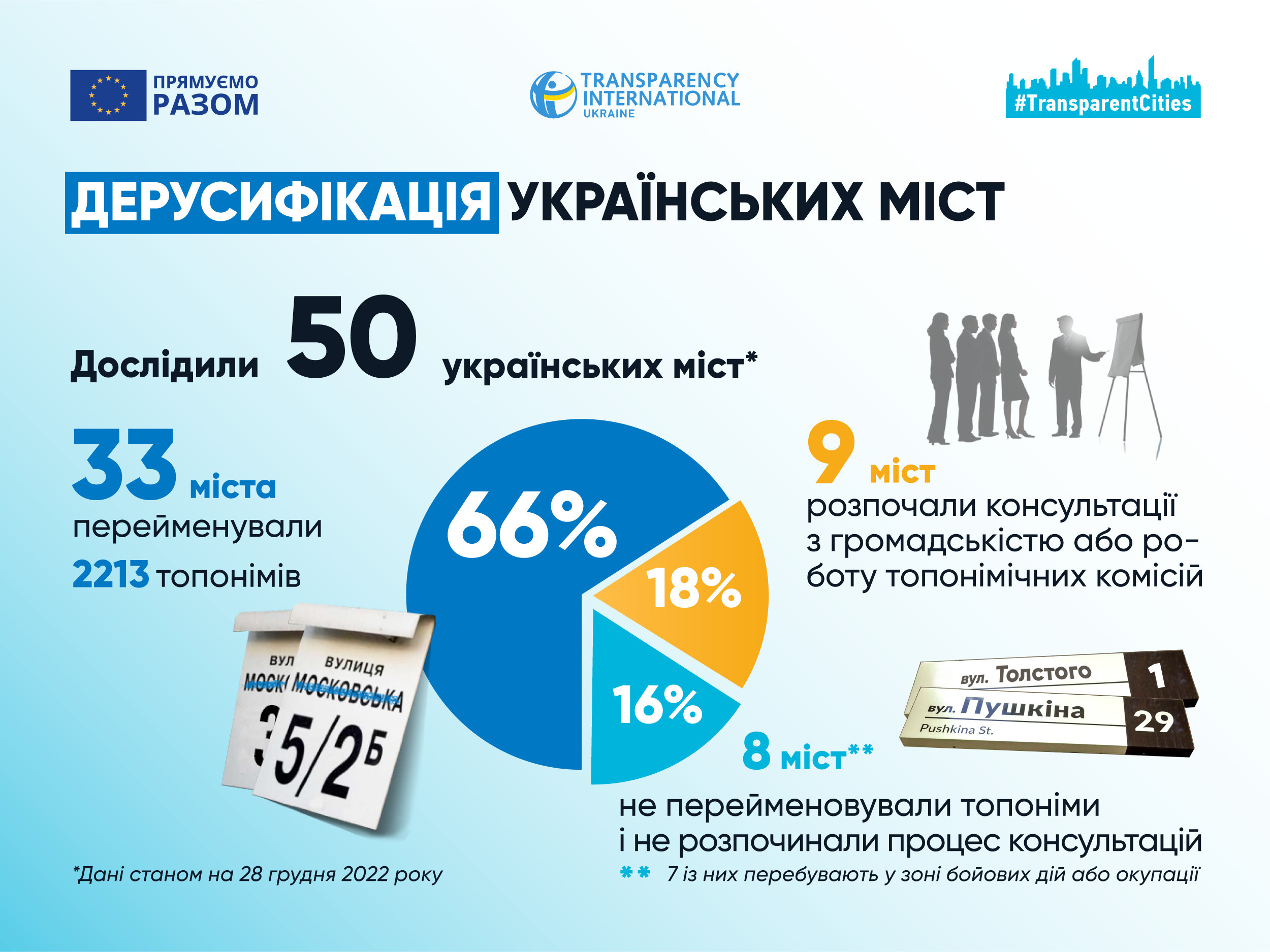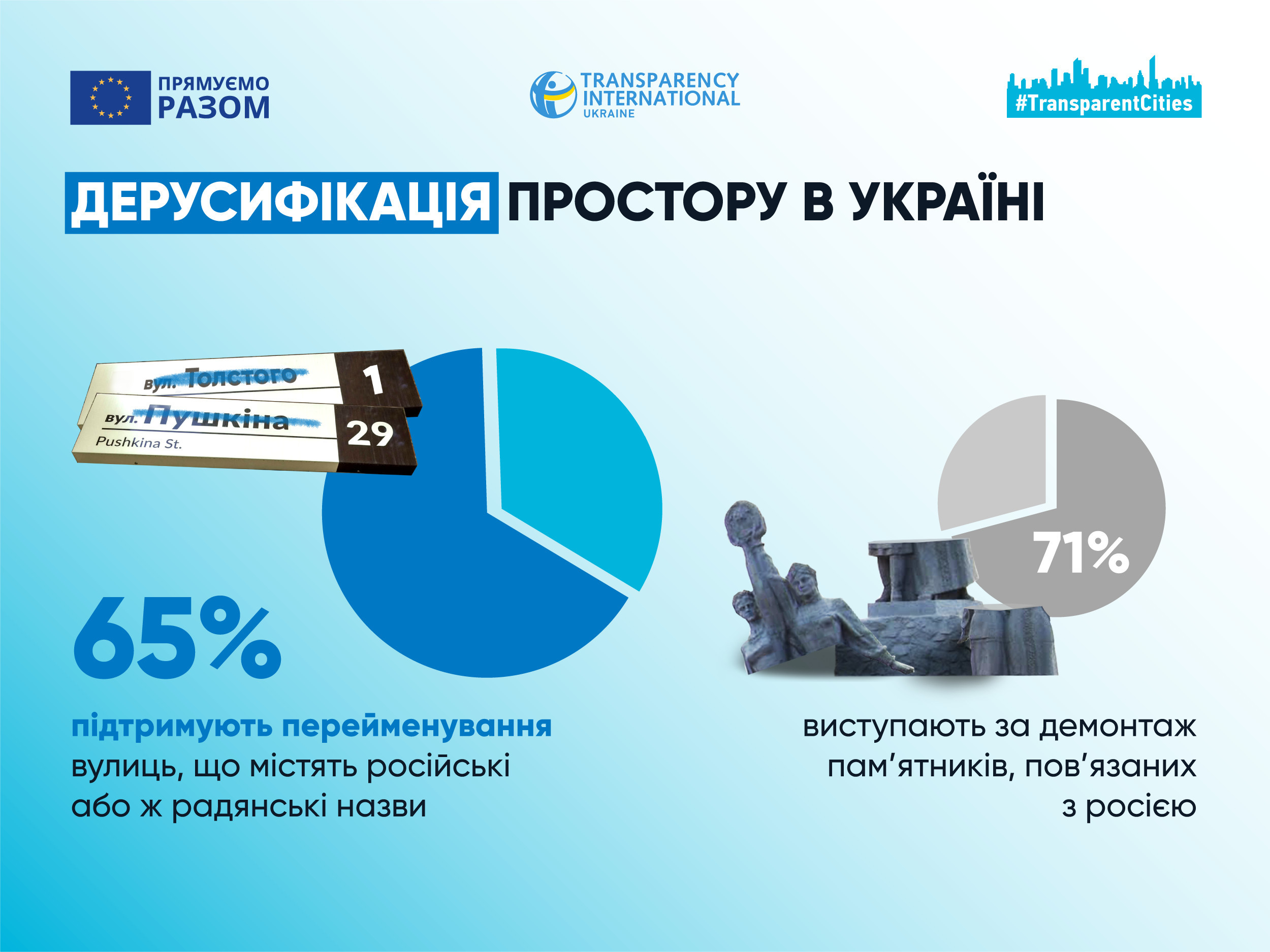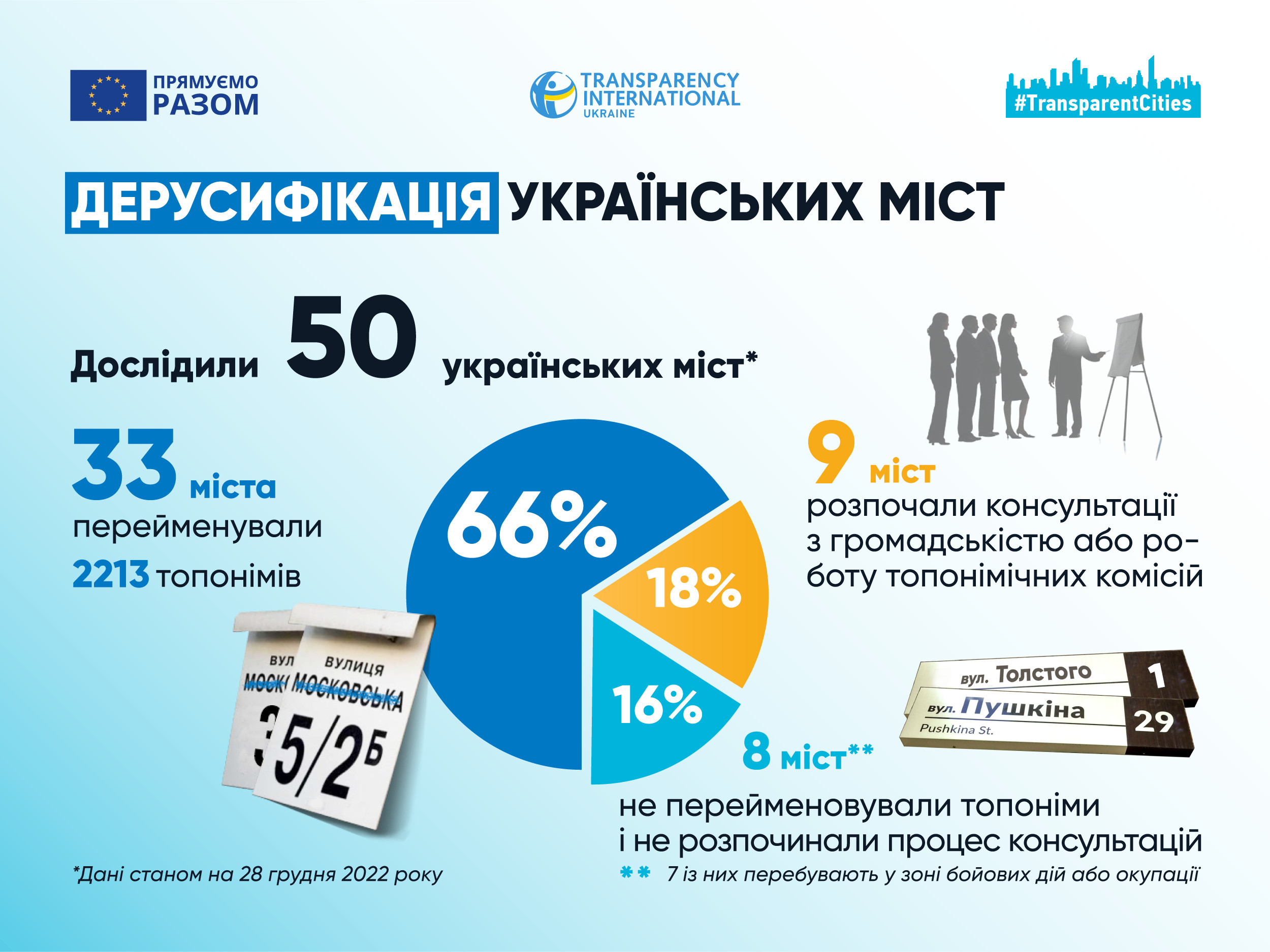Let’s find out how the authorities and residents can carry out derussification of streets, squares, and other city toponyms smoothly.
“Ukrainians have just begun to control their cultural space fully. Weeding out the crushed weeds, throwing out foreign stuff, marking coordinates, building hierarchies,” convinces Vira Aheyeva, the Ukrainian literary critic and the author of the book “Behind the Scenes of the Empire.” And the full-scale war of russia against Ukraine played a decisive role in this.
In the course of 2022, settlements were deprived of names associated with russia or its personalities. In 33 out of 50 cities, more than 2,200 toponyms have been renamed.

Despite the persistent demand of society to rename russian toponyms (more than 65% of Ukrainians are in favor), the processes of derussification are accompanied by debatable cases and criticism of citizens. Partly because it is a relatively new phenomenon, and there are no established procedures and mechanisms.
The Transparent Cities program of Transparency International Ukraine decided to study the key problems that accompany the derussification of toponyms. Since the beginning of the full-scale war, we have been studying the process of renaming toponyms, and we also contacted the Ukrainian Institute of National Memory and Taras Kremin, the Commissioner for the Protection of State Language, for clarifications.
Below, we will share the answers to 8 important questions about derussification, which are most often discussed or misunderstood.
1. Why is derussification important?
Toponyms glorifying russia or its representatives outside the empire have only one goal — to spread russia’s influence through the propaganda of the “russian world.”
The names of our streets, squares, and boulevards bear the names of those who often have nothing to do with Ukraine, its scientific, political, or cultural life. It is important for modern Ukraine to get rid of strange russian names because we have our own prominent figures, including cosmonauts, writers, and military leaders who fought for the Ukrainian state.
As of August 2022, the 10 most popular russian toponyms in Ukraine are dedicated to the following figures:
- Yuri Gagarin;
- Oleksandr Pushkin;
- Ivan Michurin;
- Valery Chkalov;
- Maksim Gorky;
- Mikhail Lermontov;
- Oleksandr Suvorov;
- Volodymyr Mayakovskyi;
- Oleksandr Matrosov;
- Volodymyr Komarov.
It is significant that the toponyms glorifying Pushkin and Gagarin are also among the 10 most common names — along with T. Shevchenko, Lisova, and Lesya Ukrainka.
In this regard, our opinion is consonant with Taras Kremin’s considerations. He calls derussification an element of decolonization and is convinced that toponyms that reflect social orientations and values should not serve as tools for achieving the imperial goals of russia.
In addition, in Ukraine, the imperial policy of linguocide of the Ukrainian language was implemented for centuries — Ukrainians were killed as its carriers, the Ukrainian language was forcibly replaced by russian in all spheres of public life (russification). Thus, a significant number of toponyms were the result of the purposeful eradication of the Ukrainian language; the strengthening of national identity is impossible without abandoning the cultivation of imperial values and narratives.
Finally, the language commissioner adds that Ukraine has become a victim of the full-scale armed aggression of russia, which relies on the concept of the “russian world.” And it is based on the use of the russian language, culture, and distorted history to promote imperial interests, political destabilization, weakening resistance to aggression.
Russia is committing war crimes, genocide, mass repression of Ukrainians, in particular, hiding behind the prevalence of its language. Therefore, it is fair and natural that today everything related to russia is perceived hostilely.
2. How to convince Ukrainians of the importance of derussification?
Among some Ukrainians, there is an opinion that Pushkin did not attack Ukraine, so the monuments to him need not be dismantled.
But the majority of our population favors derussification of space in cities and villages. Thus, 65% of Ukrainians support the renaming of streets containing russian or Soviet names, and 71% are in favor of dismantling monuments associated with russia.

The number of renamed toponyms during 2022 also speaks in favor of derussification — there are almost 10,000 of them. The experience of Lozova is indicative, where, almost immediately after the deoccupation, residents stated the need to rename more than 100 russian and Soviet toponyms.
Taras Kremin believes that the glorification of the figures of russian culture in our country was an element of the insidious policy of russification of Ukrainians, the neglect of Ukrainian culture.
According to him, today, only 7% of Ukrainians believe that the works of russian authors should be studied in schools, as before. The rest suggests either not to study russian writers at all, or not to distinguish them from among other world authors. The question arises: why Pushkin, and not Byron or someone else? Pushkin is important for russian culture, not Ukrainian.
3. What about toponyms referring to russians who fought for the rights of Ukrainians?
(e.g., Andrei Sakharov)
During decolonization, we refuse to glorify those who are not connected with Ukraine or were hostile towards it. Instead, the physicist Andrei Sakharov actively defended the rights of Ukrainian prisoners of concentration camps.
Significantly, when in 2022, Ivano-Frankivsk residents wanted to rename the street named in his honor, a number of political prisoners, in particular Mustafa Dzhemilev and Yurii Shukhevych, appealed to the city council with a request to abandon this initiative.
The Commissioner for the Protection of the State Language is convinced that the figure of Andrei Sakharov is primarily associated with the defense of universal and democratic values, for which, among other things, Ukraine is fighting today. Therefore, one needs to have solid grounds for the decision to rename the streets in his honor.
4. Who should be the initiator of decolonization: the city authorities or the public?
According to the law, the local authorities are responsible for the decolonization process, but the initiative can also come from the residents.
For example, in Mukachevo, the renaming took place on the initiative of the head of the city council, Andrii Baloha. At the same time, in Kyiv and Sumy, active residents often create petitions to decolonize certain toponyms, which are then considered at council meetings.
Taras Kremin is convinced that the leader in the issue of decolonization should be public authorities and local self-government. At the same time, it is often the public that initiates and insists on adopting appropriate decisions. The government and the activists have to work together.
5. Is it a violation of the renaming process when citizens vote for some toponyms, and the city council ultimately approves others?
The Transparent Cities program is convinced that holding public consultations will allow choosing the most suitable name that will meet the demand of residents or historical features of the area. In case of controversial or high-profile situations, we advise cities to hold a re-voting or additional consultations, as it was in Kamianske or Chernihiv.
The Ukrainian Institute of National Memory also insists that official procedures recommend local self-government bodies to adopt decisions considering the opinion of the public. The Institute also recommended that local self-government bodies consult specialists — historians, local historians, etc. — and take their opinion into account.
At the same time, the Institute of the National Memory states that the law does not contain clear obligations. But if citizens want to preserve the old names and do not agree with the renaming, which must be carried out in accordance with the law, the local authorities do have to comply with the law.
The list of obligations and powers of the toponymic commission is determined by each city council separately. As a rule, the functions of this body are reduced to advisory, namely, the formation of proposals that are submitted for discussion with citizens and the processing of residents’ proposals. The powers of the chair of the commission are also determined when establishing a toponymic commission at the local level. The final decision on renaming toponyms is made at the meeting of the council.
The Institute also reminds that the Law of Ukraine “On the Condemnation and Prohibition of Propaganda of Russian Imperial Policy in Ukraine and the Decolonization of Toponymy” was adopted by the Verkhovna Rada only in March 2023 and will come into force 3 months after signing by the President. So far, local self-government bodies, when removing russian imperial symbols from public space, have been guided primarily by the laws “On Local Self-Government” and “On Naming Legal Entities and Property by Names (Aliases) of Natural Persons, Dates of Anniversaries and Holidays, and Names and Dates of Historical Events.”
At the same time, since July 2022, the Expert Council has been operating under the Ministry of Culture and Information Policy, which also provides recommendations, in particular, it processes controversial cases. The recommendations of the Expert Council can be found on the Institute’s website.
6. How can the public influence the city authorities if it is dissatisfied with the decision on toponyms?
In case of disagreement with the decisions adopted by the city council, residents can:
- submit a local initiative with a request to reconsider the “problematic” toponym;
- request council members to introduce the issue of renaming certain toponyms in the agenda for reconsideration;
- submit petitions demanding to cancel the decision to rename toponyms or to initiate a reconsideration of names for individual toponyms.
By the way, at the beginning of the full-scale invasion, the Transparent Cities program created a sample petition that can be referred to local governments.
And after the termination of martial law, which may limit the rights of citizens to peaceful assembly, residents will also be able to influence the decisions of the city council through public hearings and reporting meetings.
Taras Kremin also considers the influence through media, social networks, direct communication with local council members to be effective — that is, the publicity. This is appropriate, considering the ban on assemblies — to preserve democratic principles and decision-making procedures in local communities. And after publications in the media, a bad decision can always be changed if there is a convincing argument and correct communication.
7. Is it necessary to hold public hearings and discussions in the process of decolonization of toponyms?
According to Transparent Cities analysts, public consultation is a prerequisite for preparing and adopting decisions on derussification. As of autumn 2022, 26 out of 41 city councils that carried out derussification consulted the public.
The Institute’s experts note that according to the law, the names of people, anniversaries and festive days, names and dates of historical events are assigned to legal entities and objects of property rights only after public discussion and with the consent of the labor collective. Another law, which will come into force in June, spells out the need to consider the position of the public and academics.
Public consultations are mandatory, in particular, for making quality decisions that will be approved by the community. But at the same time, it is important to offer an understandable and convincing concept — the principles by which new names for toponyms are proposed. Taras Kremin states that public consultation procedures should not become an instrument of containment or “chaoticization” of the entire process.
8. What should the mechanism for engaging residents in consultations look like?
During the decolonization of toponyms, cities not only hold public hearings, but also use various electronic tools to select names — such as Google forms (Kolomyia, Kropyvnytskyi), mobile applications (Kyiv), online platforms (Korosten and Chervonohrad) or chatbots (Kamianske).
We should add that the tools are not always convenient or the voting time is not commensurate with the number of toponyms to be renamed. Therefore, we expect the city councils to consider the shortcomings and try to avoid them in the future.

The Institute responds that there is an approved procedure for public consultations, and it provides for various forms of such communication. The choice of a specific form or mechanism is the decision of local self-government bodies.
Public consultation may take the form of:
- a public discussion (conferences, Internet/videoconferences, forums, public hearings, roundtables, meetings, or public meetings);
- electronic consultations with the public;
- a study of public opinion (survey, questionnaire, content analysis of information materials, focus groups, telephone “hotlines,” monitoring of comments, reviews, interviews, etc.).
Communication with the public in the form of public discussion, electronic consultations with the public, and the study of public opinion on the same issues can be carried out simultaneously.
Yes, renaming toponyms that were russified in the past is a long and complex process. However, now, our country is courageously fighting for its territory against the enemy, and our streets definitely should not contain the cultural code of a strange country, which, moreover, for several centuries has acted aggressively against our independence.
The derussification of public space is obviously important, but it is an extensive issue that requires active engagement of both local authorities and residents. However, if all parties are convinced of the need to find the best solution — everything can be organized carefully and in accordance with the requirements of the law!